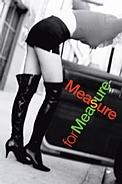Measure For Measure - National Theatre 2004
Measure for Measure has the dubious honour of being one of Shakespeare's problem plays, is it a tragedy or a comedy? And the moral themes at the heart of the story; justice, hypocrisy, forgiveness and power, are never satisfactorily resolved. Yet, it is precisely for these reasons that it seems a fitting play for the theatre company 'Complicite' who like to collide with a text rather than hide from its discord.
David Troughton's Duke dressed like a mafia Godfather, hobbles onto the stage with the aid of a walking stick and deputises power to Paul Rhy's Angelo, his second-in-command, before bidding a very temporary goodbye to Vienna. Angelo seizes the moment to purify Vienna of sexual vices and ruthlessly enforce its puritanical laws, ordering the closure of brothels and the beheading of any who indulge in acts of licentiousness. Angelo is firmly of the view that nothing emboldens sin so much as mercy.
Rhy's Angelo is sexless and appears abhorred by the flesh; it is easy to imagine him being sickened by Mistress Overdone's brothel, where every kind of sexual favour is readily available. However, when the chaste and virtuous Isabelle pleads for her brother's life, he his strangely aroused by her innocence and discovers that power is a potent aphrodisiac. Though publicly rigid in his puritanical stance, he cannot resist forcing Isabella's hand upon his now rigid passion. This discovery of sexual yearning leaves him psychologically scarred and he copes with his secret shame by indulging in self-harm.
Naomi Frederick's Isabella, like Angelo, looks gaunt and sickly, and her cropped hair makes her appear wholly passionless. Isabelle has no difficulty in choosing her virginity over her brother's life, and seems unable to understand why her brother has difficulties in accepting her choice. With a frightening single-mindedness that is born out of a merciless creed, she fumes with rage at the hypocrisies and weaknesses of others, though she does discover the quality of mercy by the play's end.
David Troughton dominates the stage as the Duke; his expressive voice captures the disposition of the character, and more than compensates for the unfortunate fact that his face is hidden throughout most of the play. Troughton weaves the mantle of the Duke's authority throughout his performance, and one is not in the least surprised that in the final scene none dare question his judgement.
Complicite is well known for its physical theatre form, but sadly it all seems rather hackneyed in this production. The sound of doors clanking at the mention of the word prison, and other mimetic effects, whilst effective in creating an atmosphere of oppression and control, grow increasingly irksome with overuse.
In Simon McBurney's production, a psychopathic craving for power and an unhealthy denial of the sexual drive combine to create a cruel society of hypocrisy and corruption, a corruption that can only be contained by absolute authority.
Alan Bird
What other critics had to say.....
NICHOLAS DE JONGH for THE EVENING STANDARD says, "Enthralling." MICHAEL BILLINGTON for THE GUARDIAN says, "Simon McBurney's production is brilliant." SUSANNAH CLAP for THE OBSERVER says, "Suddenly the play looks brutal, contradictory, unresolved: barbaric and Christian and modern." CHARLES SPENCER for THE DAILY TELEGRAPH says, "Powerfully disturbing production." BENEDICT NIGHTINGALE for THE TIMES says, "I've seldom enjoyed this tricky play more."
External links to full reviews from popular press
The Guardian
Observer
Daily Telegraph
The Times
Originally published on
